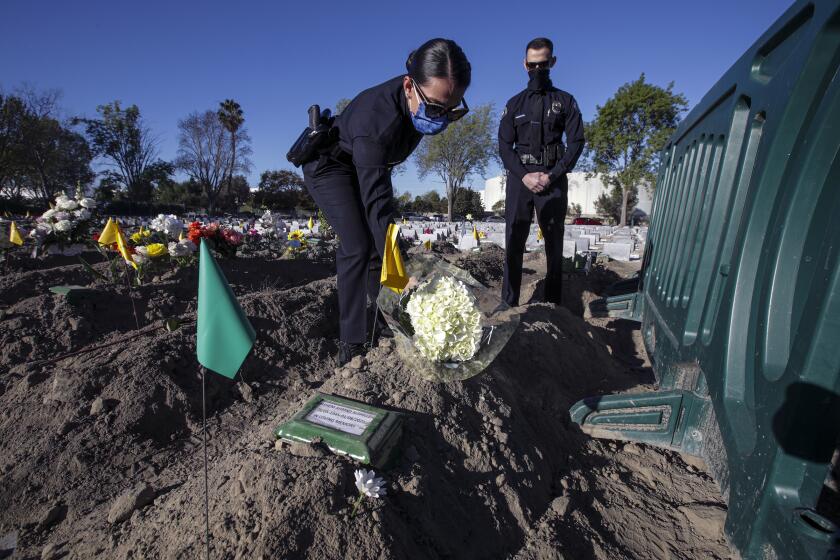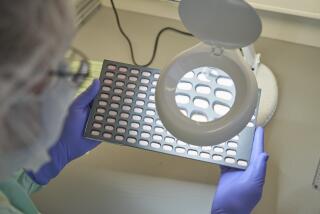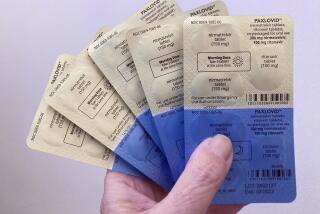Can a common antidepressant help in the fight against COVID-19?

Early last year, Angela Reiersen, a psychiatrist at Washington University in St. Louis, took ill with what she suspected was COVID-19. Because of a shortage of tests at the time, she never found out for sure, and she recovered before long. But the experience got her thinking about something.
Reiersen had recently seen research suggesting that an antidepressant called fluvoxamine was useful in treating sepsis, a potentially fatal condition in which the body releases a dangerous imbalance of chemicals known as cytokines into the bloodstream in response to an infection.
Might fluvoxamine also be effective in treating COVID-19?
On March 25, Reiersen sent an email to a colleague, Eric Lenze, also a psychiatrist, asking what he thought of her idea. Lenze was equally intrigued.
Fluvoxamine, one of a class of antidepressants known as selective serotonin reuptake inhibitors, or SSRIs, appears to activate a central nervous system protein that plays a role in regulating inflammatory responses. The psychiatrists’ working theory was that the drug might be useful in preventing the kind of inflammation that leads to severe illness and lung damage in COVID patients.
“We developed a study design,” Lenze said, “with the first patients enrolled on April 10.”
The two researchers quickly recruited 152 patients who had tested positive for the coronavirus. About half were prescribed fluvoxamine and half were given a placebo. The university had given the researchers a start-up grant of $20,000.
“I naively thought it would be easy to recruit for the study,” Lenze said, “but it was not. By May we had spent the money and I was unsure what to do; we only had about 60 recruited.”
To complete their research and test their theory, they’d need a quick infusion of additional cash.
::
In California, Silicon Valley tech entrepreneur Steve Kirsch was also thinking about the pandemic. He has a history of giving away some of his millions to good causes, and when COVID-19 began killing people last year, he had no intention of watching the destruction from the sidelines.
“I’d call it enlightened self-interest,” says Kirsch, 64, who survived blood cancer more than a decade ago and feared he was in a vulnerable population as the pandemic spread through the world.
Hashem Ahmad Alshilleh’s children didn’t fully realize the impact he’d had performing Muslim burial rites for decades until he died, and tributes began to pour in.
“I looked at the chance of death if I got COVID and I said, ‘This doesn’t look like something I want to risk.’”
Kirsch, who earned his fortune by starting Infoseek and several other companies, consulted with scientists about where his money might do the most good and came up with a plan: funding research into existing drugs that might be effective against the virus.
Kirsch laid down $1 million of his own money and tapped colleagues for another few million to set up the nonprofit COVID-19 Early Treatment Fund. Then he recruited a 12-member board of medical experts to review grant applications from researchers.
Fifty proposals sailed in, and Kirsch was particularly skeptical of one of them. The one submitted by Lenze and Reiersen.
::
The pandemic, in all its deadly fury, has unleashed a global response, with the best minds in far-flung places responding to the call for innovative remedies. Much of the attention has been focused on the large corporations and research groups racing to develop vaccines, often with government support and encouragement. But individual doctors, scientists and philanthropists like Kirsch have also stepped up to supplement and inform government action.
Kirsch’s COVID-19 Early Treatment Fund seemed tailor-made for the research Lenze and Reiersen were conducting, and when Lenze heard about it, he quickly fired off a grant proposal.
Kirsch didn’t initially buy the idea that a drug often prescribed for obsessive compulsive disorder could be useful in the fight against a virus. But in the end, Kirsch reasoned that Lenze and Reiersen weren’t asking for much money, and his board thought the scientific rationale for why the drug could help patients with COVID-19 made it worth the gamble.
Kirsch himself called Lenze with the news. “They provided about $67,000, so we were able to finish the study,” Lenze said.
Several weeks later, in August, it was Kirsch’s turn to get good news. Lenze called with highly encouraging results. The trial had been small, but none of the patients treated with fluvoxamine deteriorated, while six of those receiving the placebo did.
Kirsch could hardly contain himself.
“I said, ‘We gotta tell the world, this is fantastic.’”
::
The researchers’ initial results were promising enough that the prestigious Journal of the American Medical Assn. accepted a paper on them, which appeared in November.
While noting that the sample was small, and the findings preliminary, the paper called the results “clinically significant” and called for larger, randomized trials to establish additional clinical proof of the drug’s effectiveness.
If it had been up to Kirsch, fluvoxamine would have immediately become a go-to therapeutic tool on the basis of that trial.
His Silicon Valley mindset made him impatient to get what he thought of as an “absolutely game-changing” treatment into common use as quickly as possible.
But others, including Reiersen and Lenze, felt more research was necessary, despite the strongly encouraging results.
Carefully conducted, exhaustive large-scale trials exist for a reason. Taking a shortcut, in this case with a mind-altering drug produced for an entirely different purpose than treating COVID-19, can carry unintended or unforeseen risks.
From their living rooms and pickup trucks, amateur radio operators reach out to the International Space Station, circling 240 miles above Earth.
“A lot of once-promising drugs prove to be useless or even harmful when they are tested in sufficiently rigorous clinical trials,” said Dr. Leigh Turner, associate professor at the Center for Bioethics and School of Public Health at the University of Minnesota.
Some studies, for example, suggested that hydroxychloroquine might be useful in treating COVID-19, and it was widely touted by President Trump and others. The Food and Drug Administration granted emergency authorization for its use as a COVID treatment in March but later revoked the authorization after further research concluded that the drug’s risks outweighed any potential benefits.
Turner said well-intentioned examinations of a wide range of medical interventions have taken place all over the world, but so far there’s not a great track record of success for treatment of COVID-19. There does, however, appear to be “enough evidence to make a plausible scientific case” for further study of fluvoxamine, Turner said.
::
At the same time that Lenze and Reiersen were beginning their look at fluvoxamine, a psychiatrist in France had noticed something he found remarkable. As the virus raged through every sector of French society, psychiatric patients were not getting sick at the same rate or with symptoms that were as severe.
“My hypothesis in early March was that … antidepressants including fluvoxamine and fluoxetine could work for COVID because of their anti-inflammatory and potentially antiviral properties,” said Dr. Nicolas Hoertel, associate professor of psychiatry at Paris University and a psychiatrist at a hospital just outside the city.
“I also noticed at this time that almost no patients with psychiatric disorders hospitalized in my unit had symptomatic COVID, whereas many caregivers had COVID symptoms in the unit,” Hoertel said.
Could it be, he wondered, that the patients were getting some protection from their prescribed antidepressants?
Hoertel said he checked with colleagues at hospitals in and around Paris and found others who had made the same observation. He and some colleagues then scanned a database of 15,000 patients at 39 affiliated hospitals and concluded, in a study published in France in July, that antidepressants “could be associated with lower risk of death or intubation in hospitalized patients with COVID-19.”
Could it be, he wondered, that the patients were getting some protection from their prescribed antidepressants?
Reiersen and Lenze had no idea that doctors in France were sniffing up the same trail. It was Kirsch, eager to find evidence of fluvoxamine’s promise, who learned of the discoveries near Paris and linked the French and American doctors.
“We had a great exchange about the potential mechanisms that could underlie the effect of fluvoxamine,” Hoertel said.
::
Kirsch was ever more determined to spread the word, and got a chance to do so on Nov. 12, when he was the guest speaker at a teleconference arranged by the Harvard Business School Assn. of Northern California.
His host was Dr. David Seftel, chief executive of a Bay Area disease diagnosis company called Enable Biosciences and longtime physician at Golden Gate Fields, the horse racetrack in Berkeley. Seftel found Kirsch’s presentation “mesmerizing,” but it also turned out to be timely.
Shortly after Seftel hosted that conference with Kirsch, there was a large COVID-19 outbreak among employees at Golden Gate Fields, forcing closure of the track.
“We tested 524 people and 200 came back positive,” Seftel said.
He suspected the virus spread quickly because so many of the employees live at the track, in close proximity, while caring for the horses. The virus hit all age groups, with a range of severity.
“I thought, ‘How do I intervene? How do I help these people avoid hospitalization?’”
Based on the study by Lenze and Reiersen, he decided to offer fluvoxamine to sick employees who wanted to try it. Seftel said 40% of the employees who tested positive for COVID-19 agreed to take fluvoxamine, and what happened over the next two weeks was eye-opening, if not rigorously controlled enough to provide the kind of scientific data produced by an actual study.
“In the group that got fluvoxamine there were no hospitalizations, and in the group that did not, 12.5% were hospitalized, with one fatality,” Seftel said.
Seftel said a couple of his patients reported mild nausea and abdominal discomfort, but those disappeared after he slightly altered the dosage. The antidepressant can interact with other drugs a patient is taking and can have side effects, including abdominal discomfort and sleep disturbances.
“In a pandemic, the question is how much proof is enough and what is the risk-benefit ratio?” said Seftel, who noted the current surge of COVID-19 cases and the rising body count.
Seftel’s experience heightened Kirsch’s impatience. “Why wait any longer?” he asked.
::
Dr. Robert Siliciano, a scientist in the infectious diseases department of Johns Hopkins University and a member of Kirsch’s COVID treatment board, says he is quite optimistic about fluvoxamine, but believes a larger study is needed before there’s “a huge change in treatment recommendations.”
In St. Louis, Lenze and Reiersen are hustling to complete that larger study. They have recruited symptomatic participants from Los Angeles and elsewhere, with a goal of 800 patients. Anyone interested in learning more or signing up for the trial can do so at stopcovidtrial.wustl.edu.
As optimistic as Lenze and Reiersen remain, neither wants to rush the process. If she were to have COVID now, Reiersen says, she wouldn’t prescribe the drug to herself.
“I’d prefer to participate in a clinical trial,” she says, which would “benefit many people and not just me.”
The COVID-19 Early Treatment Fund is financing the researchers’ larger study along with the Skoll Foundation, Fast Grants, Flu Lab and Cures Within Reach.
And as it proceeds, Kirsch stands by, as hopeful and as impatient as ever.
More to Read
Sign up for Essential California
The most important California stories and recommendations in your inbox every morning.
You may occasionally receive promotional content from the Los Angeles Times.










